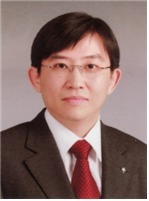people

Professor Sang Ouk Kim of the Department of Materials Science and Engineering, KAIST, received the Scientist of the Month Award in June 2014 for his development of a fundamental technology that allows free control of the properties of carbon-based materials.
Since June 1997, the Korean government has awarded monthly one scientist working in industry, universities, or research institutions to recognize his or her research achievements, as well as to promote science and technology.
Professor Kim implemented a technique known as doping, which has been used in ordinary semiconductor processes, to demonstrate the physical properties of carbon-based materials. Carbon nanotubes, graphene, and other carbon materials have superior mechanical and electrical properties and are regarded as next-generation materials. However, difficulty in controlling their qualities has made applications in various devices unfavorable. The doping technique in semiconductor production is to artificially introduce impurities into an extremely pure semiconductor for the purpose of modulating its electrical properties.
Profess Kim doped elements like nitrogen and boron to enable minute control of the physical properties of carbon-based materials and applied the technique to development of organic solar cells, organic light-emitting devices, and flexible memory. He also increased the application range by using a self-assembly method to change freely the structure of carbon-based materials.
Professor Kim has published 53 papers in renowned journals such as Advanced Materials and Nanoletters. He was rewarded further by being invited to write a review paper for the 25th anniversary special edition for Advanced Materials.
-
event KAIST Professor Uichin Lee Receives Distinguished Paper Award from ACM
< Photo. Professor Uichin Lee (left) receiving the award > KAIST (President Kwang Hyung Lee) announced on the 25th of October that Professor Uichin Lee’s research team from the School of Computing received the Distinguished Paper Award at the International Joint Conference on Pervasive and Ubiquitous Computing and International Symposium on Wearable Computing (Ubicomp / ISWC) hosted by the Association for Computing Machinery (ACM) in Melbourne, Australia on October 8. The ACM
2024-10-25 -
event KAIST Industrial Design’s Professor Sangmin Bae’s team selected as Top 20 of James Dyson Award 2024
KAIST (President Kwang-Hyung Lee) announced that the 'Oxynizer', a non-electrical medical oxygen generator for developing countries designed by Professor Sangmin Bae's team in the Department of Industrial Design, has been selected to be the Top 20 of the James Dyson Award 2024. At the same time, it was announced on the 16th that it was selected as one of the top 100 ‘Prototypes for Humanity’ 2024 and will be exhibited in Dubai in November. < Photo 1. Photo of the award-winnin
2024-10-16 -
event KAIST Professor Jiyun Lee becomes the first Korean to receive the Thurlow Award from the American Institute of Navigation
< Distinguished Professor Jiyun Lee from the KAIST Department of Aerospace Engineering > KAIST (President Kwang-Hyung Lee) announced on January 27th that Distinguished Professor Jiyun Lee from the KAIST Department of Aerospace Engineering had won the Colonel Thomas L. Thurlow Award from the American Institute of Navigation (ION) for her achievements in the field of satellite navigation. The American Institute of Navigation (ION) announced Distinguished Professor Lee as the winner o
2024-01-26 -
people Professor Joseph J. Lim of KAIST receives the Best System Paper Award from RSS 2023, First in Korea
- Professor Joseph J. Lim from the Kim Jaechul Graduate School of AI at KAIST and his team receive an award for the most outstanding paper in the implementation of robot systems. - Professor Lim works on AI-based perception, reasoning, and sequential decision-making to develop systems capable of intelligent decision-making, including robot learning < Photo 1. RSS2023 Best System Paper Award Presentation > The team of Professor Joseph J. Lim from the Kim Jaechul Graduate Scho
2023-07-31 -
event KAIST Holds 2023 Commencement Ceremony
< Photo 1. On the 17th, KAIST held the 2023 Commencement Ceremony for a total of 2,870 students, including 691 doctors. > KAIST held its 2023 commencement ceremony at the Sports Complex of its main campus in Daejeon at 2 p.m. on February 27. It was the first commencement ceremony to invite all its graduates since the start of COVID-19 quarantine measures. KAIST awarded a total of 2,870 degrees including 691 PhD degrees, 1,464 master’s degrees, and 715 bachelor’s degrees
2023-02-20